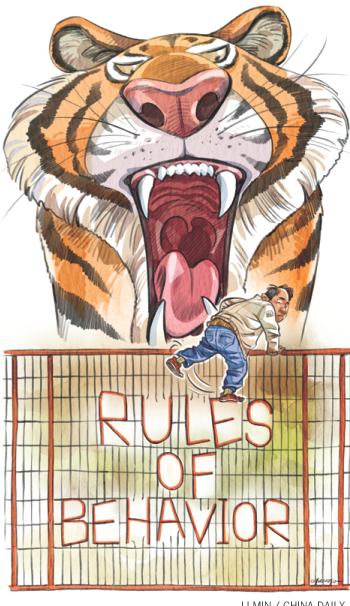Not cold hearted, just less tolerance for rule-breakers
- By Zhang Zhouxiang
 0 Comment(s)
0 Comment(s) Print
Print E-mail China Daily, February 4, 2017
E-mail China Daily, February 4, 2017
|
|
|
LI MIN/CHINA DAILY |
On Sunday, the second day of Spring Festival, a man was killed after he fell into the tiger enclosure while trying to get into the zoo in Ningbo, East China's Zhejiang province, without paying for a ticket.
The tragedy cost two lives, as the tiger was shot dead when zoo employees tried to rescue the man.
Video posted online shows a tiger mauling the man as visitors scream in horror at the Youngor Wildlife Park. Two other tigers stand nearby watching. Later reports say police shot the tiger that attacked the man while staff at the wildlife park drove the other tigers away using firecrackers and water cannon.
As news of the incident spread, the majority of voices online blamed the dead man for the animal's death. On Sina Weibo, China's equivalent of Twitter, there even emerged hashtags such as #Condolences to the innocent tiger or #Sympathy with the victim tiger.
Some said this was a sign that people are becoming more cold-hearted. But they are wrong. People have been displaying increasingly more enthusiasm for helping those in need and participating in charity work. In 2016, the China Charity Federation received donations of 18.8 billion yuan ($2.7 billion) in total, 46 percent more than the donations received in 2015, and they sent helping hands to one tragedy after another.
People are just tired of forgiving those in the wrong. While the sentiment is right, it has been abused too much. When somebody commits a crime, no matter how cruel the crime is, media outlets depict the culprit's miserable childhood and there are calls for forgiveness. When someone smokes in public, there are always people calling for tolerance.
People are fed up and angry with lawbreakers escaping their due punishments in the name of forgiveness and tolerance.
But going back to the tragedy at the wildlife park in Ningbo, the tiger's death shows the park was not well prepared for such emergencies. They did not have any tranquilizer guns that could sedate the tiger immediately and save the lives of both the man and the endangered animal.
When a young bear escaped from a zoo in Ohio last year, posing a threat to tourists' safety, the authorities responded immediately and used a tranquilizer gun to capture it. Such tranquilizer guns should become standard equipment in China at all zoos and safari parks that are home to wild animals.
And, on another level, perhaps it is time to reflect on whether zoos and wildlife parks have had their day. As Jason Baker, vice-president of international campaigns for People for the Ethical Treatment of Animals, noted in a statement after the incident in Ningbo: "Attacks by captive big cats on people-which occur with staggering regularity-illustrate the profound level of stress, anxiety and agitation these animals experience every day of their lives."
In the meantime, it is necessary to raise people's awareness that the animals in zoos and wildlife parks are not domesticated pets, and of the need for visitors to observe rules for their own safety.
The incident in Ningbo came only six months after one woman was killed and another was mauled by tigers after they got out of their car while visiting Badaling Wildlife World in Beijing.
And just hours after the tragedy in Ningbo, some other tourists still tried to avoid paying for tickets by climbing over the wall. A camera even recorded how they quarreled with the zoo staff who tried to stop them.
It seems the sense that the rules might be there for their benefit is still illusive among some people. Although the odds of being attacked by a tiger are rather slim, they increase remarkably if one ignores the rules protecting one from the threat.
The man in the Ningbo incident paid for his fault with his life, but the tiger was killed for his fault, too.
The author is a writer with China Daily.






